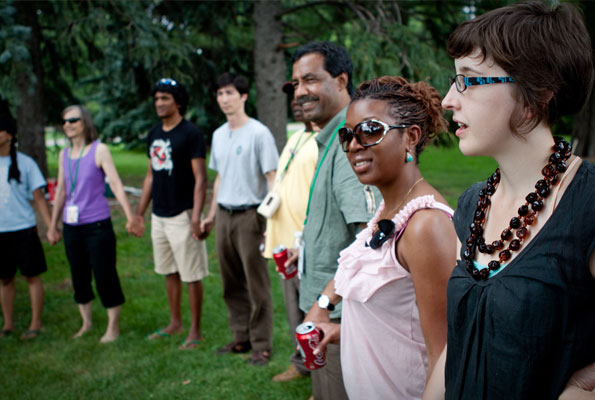2006
D-Lab Founder and MIT senior lecturer in Mechanical Engineering Amy Smith is inspired to create a hands-on conference bringing together creative, dynamic individuals to design meaningful solutions for people living in poverty. NCIIA, now VentureWell, and the Rockefeller Foundation generously provide seed funding and planning gets underway at MIT.
2007
After months of planning, the International Development Design Summit (IDDS) is born. 50 people from nearly 20 different countries arrive at MIT for the first IDDS. Participants form teams and tackle some of the first IDDS projects, receiving training in design, rapid prototyping, and development in workspaces around MIT’s campus.
2008
IDDS is held at MIT again, with a new and additional focus on capacity building. Participants from 20 countries learn about the design process and designed technologies like a $10 computer, a pearl millet thresher, and a device to prevent transmission of HIV from mothers to children during breastfeeding.
2009
IDDS is held for the first time in a developing country – Ghana. Nearly 70 participants work together with rural villagers in Ghana to design prototypes with their potential end-users. Technologies included a low-cost device for dosing chlorine for drinking water and a hand-cranked cassava grater.
2010
IDDS is held at Colorado State University and focuses on refining products, designing ventures, and building businesses. Participants build action plans for prototypes from other summits to get impactful technologies into the hands of the people who need them most.
2011
IDDS is held in Ghana again and its integrated curriculum reflects lessons learned from all past IDDS experiences. Organizers and participants reflect on the evolution and future of IDDS. Rethink Relief, a design summit sharing the IDDS philosophy, but focusing on the technology needs of refugees, takes place for the first time in Delft, Netherlands.
2012
IDDS is held in Brazil, a summit of many firsts: the first to be organized by a local team, the first with an urban focus, and the first to be entirely bilingual. Many projects focus on improving the lives of people living in poverty by having a positive effect on the environment.
The International Development Innovation Network (IDIN) is created as part of the USAID Higher Education Solutions Network to support the growing number of IDDS alumni in their work. IDIN provides funding, mentorship, training, and more to help its Network members and their innovations grow.
2013
IDDS is held in Lusaka, Zambia and organized for the first time by IDIN Network members in collaboration with the National Technology Business Centre. A shorter, maternal health-themed IDDS is held in Arusha, Tanzania, marking the first themed IDDS. Rethink Relief, a design summit focused on the technology needs of refugees and displaced populations, takes place at MIT. IDIN launches its research program. Local chapters of Network members begin forming.
2014
IDDS is held in Arusha, Tanzania, where participants develop technologies to solve problems related to agriculture, health, water, and education. Rethink Relief, a design summit focused on the technology needs of refugees and displaced populations, takes place in Pader, Uganda. IDIN supports three innovation centers: Twende/AISE! in Tanzania, Caritas in Uganda, and Caos Facado in Brazil.
2015
IDDS is held in Botswana, Colombia, and India. IDIN opens up its innovation center partners program, welcoming 12 new grantees and creating a global innovation centers community of practice where centers can share lessons learned and collaborate virtually. D-Lab's Practical Impact Alliance holds its first-ever Co-Design Summit in Ghana.
2016
IDDS is held in Brazil, Colombia, Pakistan, and Uganda. The IDIN Network grows to over 825 members. D-Lab's Practical Impact Alliance holds a Co-Design Summit in Zambia in partnership with World Vision and National Technology Business Centre.
2017
IDDS is held in Colombia, Thailand, and Guatemala. The IDIN Network grows to over 1,000 members. D-Lab's Practical Impact Alliance holds a Co-Design Summit in Colombia in partnership with World Vision and C-Innova. The IDIN program as funded by the USAID US Global Development Lab comes to a close.
2018
IDDS includes summits in Colombia, Botswana, and Kenya. The IDIN Network numbers over 1,000 members, and continues to collaborate and connect with one another across the globe, sharing resources, working on projects, hosting summits and design trainings, running maker spaces, and more. The International Development Design Summits are managed and planned by an international steering committee.





